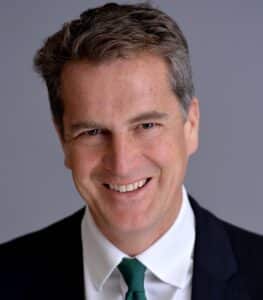In the latest fund manager interview from FundCalibre, Peter Michaelis, manager of the Liontrust Sustainable Future Managed fund, who has over 20 years experience in sustainable responsible investment, talks about why “sustainability is a journey, not a destination”. He shares the evolution of sustainable investing, including challenges in recent years, and why the future remains bright — despite the potential impact of politics and Trump 2.0.
This interview was recorded on 17 February 2025. Please note, answers are edited and condensed for clarity. To gain a fuller understanding and clearer context, please listen to the full interview.
Interview highlights:
London Fashion Week
“The fashion industry is apparently responsible for about 10% of greenhouse gas emissions. Because of the way our clothes are made and used, they are contributing a huge amount to the resource inefficiencies in our system and carbon emissions, as well as all the other aspects around long supply chains. So that’s the problem.
“Is there any solution? Well, we think there’s solutions around resale. Or rental, particularly in workwear rental, which seems to be a big growing market. But there’s one interesting area, I think, which is to use AI and automation. So the idea is that they would scan Peter and they would say, this is exactly your size. These are the types of things you like to wear, which would look good on you, and we can make them locally to fit you properly. And using AI and automation, you suddenly get a much better product and a much shorter supply chain. That’s kind of the model that I’ve heard about, which I think actually could really solve this whole dilemma around fashion.
“There’s an interesting company which is called Winmark, which is a franchise system, including companies like Plato’s Closet, which is big in the US. Essentially you go there and you bring your clothes and then you get credits to buy clothes. And they’re very good at curating the clothes they get. As a franchise model it’s growing very fast around the US as people realise that you can get great clothes and update your wardrobe as often as you like, but for much, much less than buying it new.”
Challenges to the fund’s performance
“Over 10 years, if you’d invested in our strategy, it would’ve given you 130% return. If you’d invested in the average fund in the peer group, it would’ve been 73%. And that’s really the same picture over 5, 10, 15, and 20 years.
“The three years numbers are less compelling. So it is a return of 11% versus 15% for the peer group. So we’re sort of behind that peer group average, which is obviously not where we want to be, and it’s not where our clients should expect us to be longer term.
“So, why are we here? Well, principally in 2022 and 2023 and a bit 2024, we’ve had three things happening. The first is inflation – we’ve had a really, really long period of zero interest rates and very modest inflation. The second aspect is geopolitics and UK politics. And then subsequently it’s been a really unusual market in global equities, particularly. We’ve had this narrowness of leadership, which really focused on those Magnificent Seven, the sort of AI mega-cap leadership. And that narrowness has been something which hasn’t helped our strategy relatively overall.
“Now as to the future, we do think that the themes we invest behind remain very strong. And we think that they’re structurally very strong themes, and so they should continue to perform, with good growth prospects for companies linked to them. The second thing we believe is that the markets will broaden. We can’t persistently have the market performing well only because half a dozen companies are performing well. It just can’t happen mathematically. So we think the markets will broaden and the mid-cap area of the market where we’re invested in should be well positioned to benefit from that.”
Trump 2.0: good or bad for sustainability?
“I guess the benefit of having managed the strategy for so many years is that we’ve seen all flavours of politicians, but the structural trends behind a cleaner, healthier, safer world, they don’t seem to change.
“When Trump was last in power, coal fired generation in the US fell more than under any other President. If you think as well, many of our investments are about improving infrastructure. So we have companies involved in managing water in the US and companies involved in the construction in the US, all of which are going to benefit from the kind policies being talked about. So it’s not straightforward that Trump’s actions are going to be negative for sustainable investment.
“Obviously, it would be better for a number of reasons to have a president in the White House that cared a bit more about climate change and wanted to be more progressive on social issues than we’re seeing. But we always drill it down to an individual company level and say, how is this going to affect the outlook for this company or that company? And there are very few companies where we’re thinking there is really a risk from a policy emerging out of the White House.”
Conclusion: Despite recent market challenges, the fundamental themes driving this fund remain as strong as ever. As markets evolve and broaden out, there’s real potential for these companies to outperform. This interview gives an excellent case for how to align strong financial returns with a positive global impact.
Main image: diego-jimenez-A-NVHPka9Rk-unsplash
































